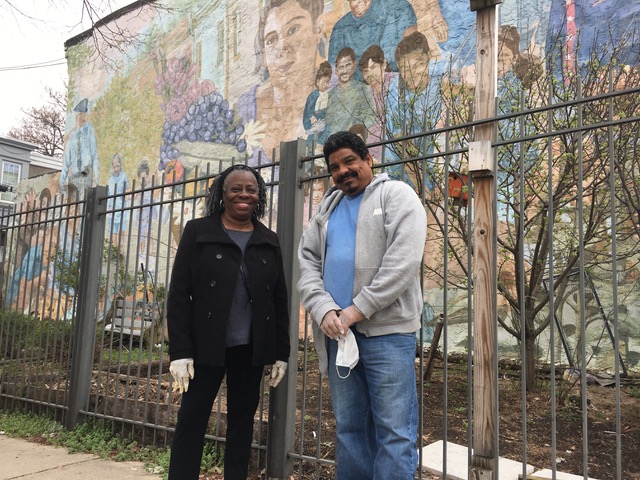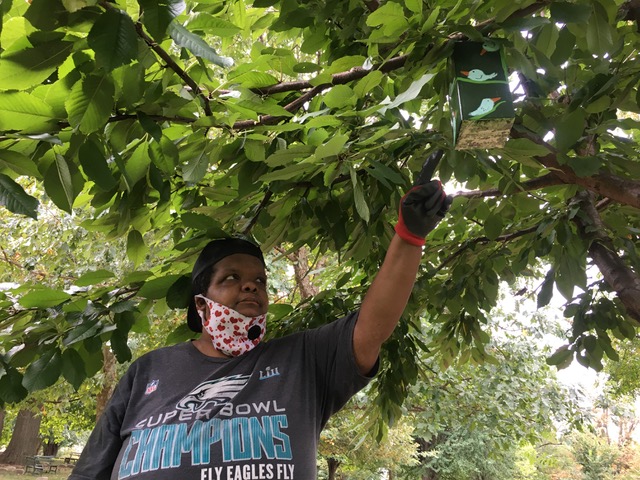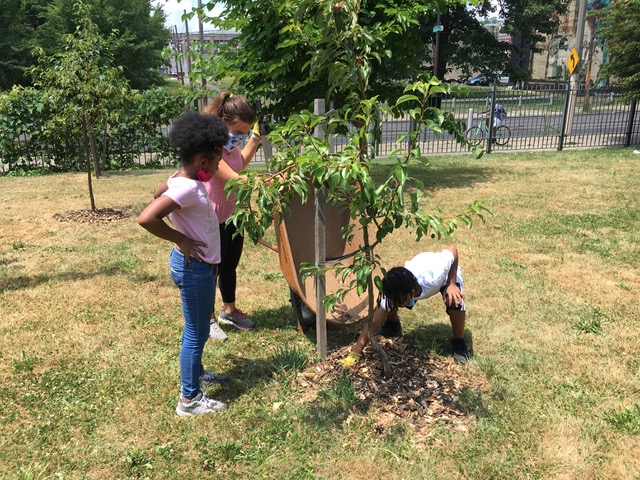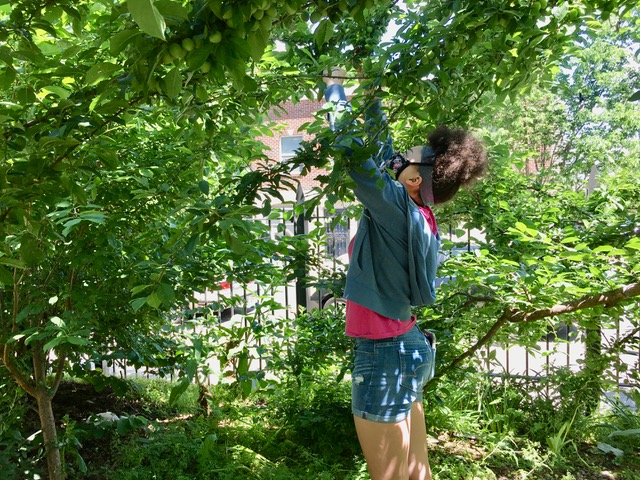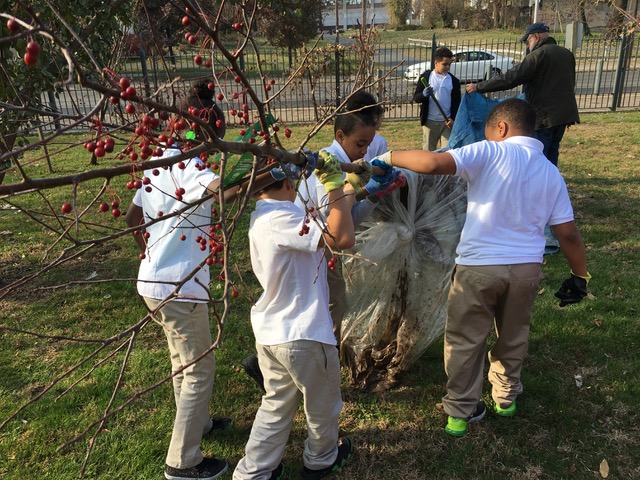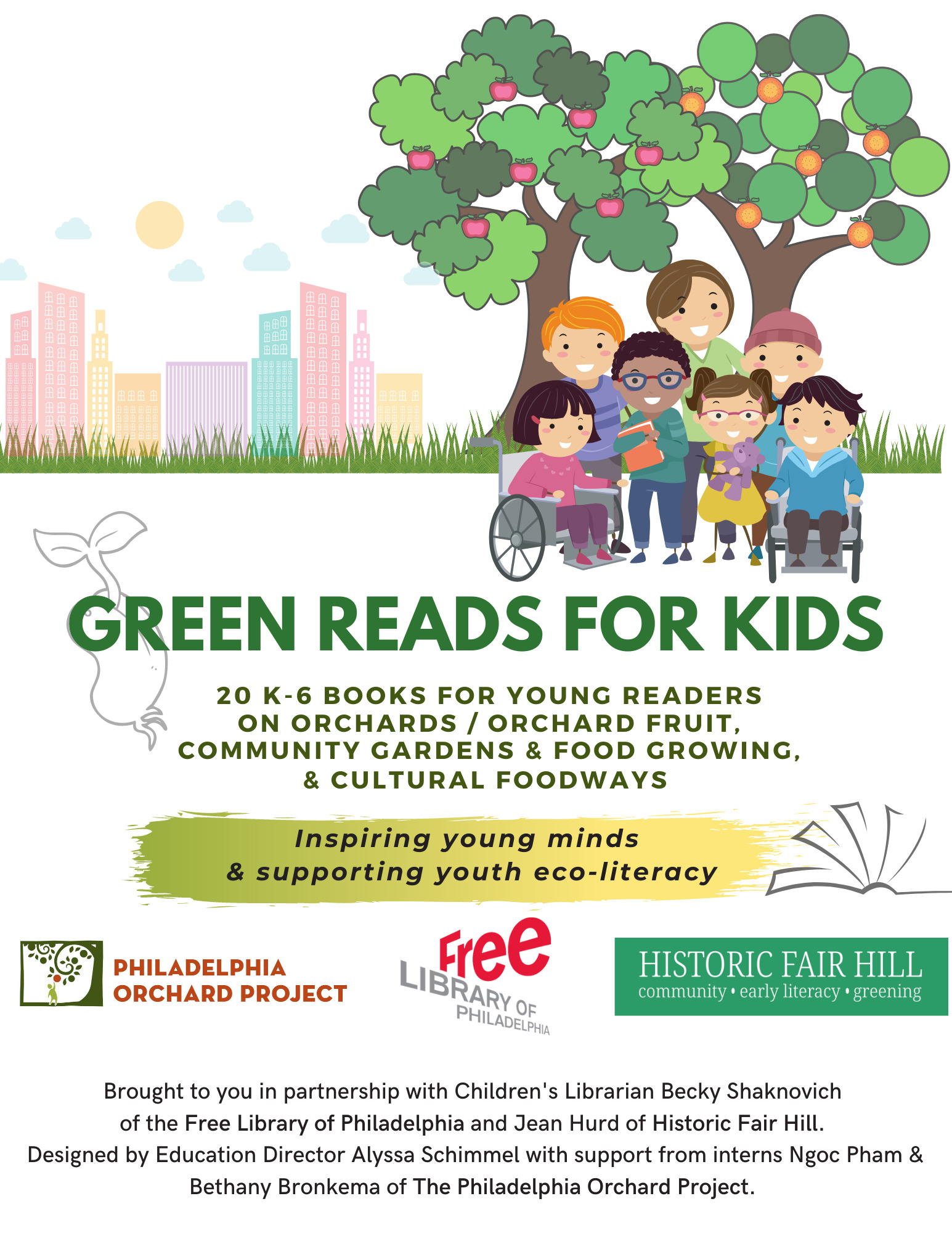Historic Fair Hill, POP partner since 2011
In the late 1600s, the Fairhill neighborhood was forest and farmland, and Germantown Avenue was a Lenni Lenape trade route, a thoroughfare between Philadelphia and the outlying rural areas. William Penn owned a large section of land after Europeans colonized the area. After his death, that land was passed down to the English founder of Quakerism, George Fox, and eventually, evolved into Historic Fair Hill, a neighborhood on Germantown Avenue with robust Latinx and Black American communities and cultural influence. While Historic Fair Hill is exactly that, historic — it has long had an impact on the future of North Philadelphia and beyond.
We’ve heard the cliché before—you have to know your history to understand the present and prepare for the future. Historic Fair Hill’s (HFH) mission extends beyond preserving American history, it’s using history as an education tool. “The 300-year-old Quaker burial ground is important to the history of Philadelphia and America’s ongoing struggle for justice and equality,” Lana Mejias, a former member of HFH’s garden team, said in an interview. “We can learn from the abolitionists and civil rights leaders buried here.”
The Quaker community in the city played significant roles in those movements. Quaker minister Lucretia Mott, was an activist and feminist dedicated to ending slavery. She founded the Philadelphia Female Anti-Slavery Society in 1833 and the National Anti-Slavery Coalition of American Women in 1835. She spent some time living on North 9th Street, and her resting place is in the Fair Hill burial ground. Other leaders, including cofounder of the Philadelphia Female Anti-Slavery Society Harriet Forten Purvis and abolitionist Robert Purvis left an impact on the neighborhood and are buried here. Fairhill is one of the city’s first integrated cemeteries, and is emblematic of how Quakers established a foundation predicated on social change, integration, and equality. However, as useful and educational as history is, history alone isn’t enough to resolve present-day issues.
While Historic Fair Hill may have pioneered integration and is a landmark when it comes to civil rights, the organization as it stands now still has responsibility with its North Philadelphia residents. That begins with looking at how it’s instrumental in revitalizing and sustaining the Fairhill community, and that includes school partnerships for literacy, greening, and community engagement events in addition to preserving the burial ground and fulfilling Quaker ideals. “I want to teach community members, youth, and families about gardening/farming and how it is important to our human health and larger community well-being,” Mejias said. “I hope to gather feedback from residents about what they want to see and how they would like to get involved with us.”
Literacy and education are vital in supporting a neighborhood like Fairhill and North Philadelphia. Since you are where you eat, one of the biggest issues facing North Philadelphia is its food deserts. According to a study by Philadelphia’s Department of Health, North Philadelphia residents have a decreased life expectancy of nearly 20 years compared to Center City residents. Residents of East Germantown went 40 years without a grocery store with fresh produce. Nearly all of Center City residents are within a half-mile away from a grocery store. For North Philly residents, nearly half are more than a half-mile away. This leaves North Philly residents with little options when it comes to healthy foods, and it produces unhealthy eating habits. It’s hard to practice social change on empty calories, but teaching literacy in farming and gardening is a huge step to resolving North Philly’s significant food and green space issues.
Historic Fair Hill, a POP partner since 2011, manages four small orchards where neighbors help care for the trees and surrounding gardens. The main site, within the gates of the cemetery, has been expanded over the years and currently contains well-established plantings of figs, peaches, plum, and cherry trees. Berry and pollinator gardens intermingle with annual plants and flowers grown by HFH farmers and volunteers for their weekly neighborhood farmstand. The farmstand takes place every Monday morning from 9-12 on Cambria St. with St John’s Memorial Church food pantry. The burial ground also boasts a group of productive juneberry trees along the Cambria Ave fence that pre-date POP’s involvement. Neighbors and POP staff and volunteers harvest the delicious berries each spring. Another POP orchard planted at the Evelyn Sanders townhomes of the Women’s Community Revitalization Project, is under the care of HFH stewards with figs, apples, and raspberries. POP has inspired HFH to plant fruit trees in their other gardens, at Julia deBurgos School and Potter Thomas School. A full list of its partner schools and gardens can be found here.
“The conversation with people who may not know or understand the value of the garden starts by storytelling and informing them of who is buried in the cemetery and what they did for our freedom today,” Mejias said. “Then, we try to figure out what that specific person is interested in, what their needs and wants are, so that we can introduce them to one or more of our programs. We let people know that this is their neighborhood so they can come by whenever they want and actually use the green spaces.”
Urban green spaces are vital and essential for a community. They promote mental and physical health, can help with reducing air pollutants and emissions, stimulate the community, and more. They can also fall victim to eco-gentrification, and North Philadelphia is a vulnerable community. Pushing back against potential gentrification in all its forms begins with education and literacy.
“We support literacy in our local public elementary schools,” Mejias said. “We have helped reopen school libraries in three partner schools and bring in volunteers and parents to give children one on one support. We operate free book stands and work with parents and teachers in literacy efforts.” HFH also coordinates a reading buddy program with Julia de Burgos School: you can find out how to become a volunteer here.
Historic Fair Hill and the Philadelphia Orchard Project are collaborating and educating Fairhill residents, providing resources and information, and seeding equitable, sustainable, and solvent green solutions. History has told us what we need to know, and now it’s up to us to carry on its lessons in the present for the sake of the future of North Philadelphia.
This blog post was written by Kyle V. Hiller, with editing by POP co-executive director Kim Jordan.
SUPPORT US! If you found this entry useful, informative, or inspiring, please consider a donation of any size to help POP in planting and supporting community orchards in Philadelphia: phillyorchards.org/donate.
